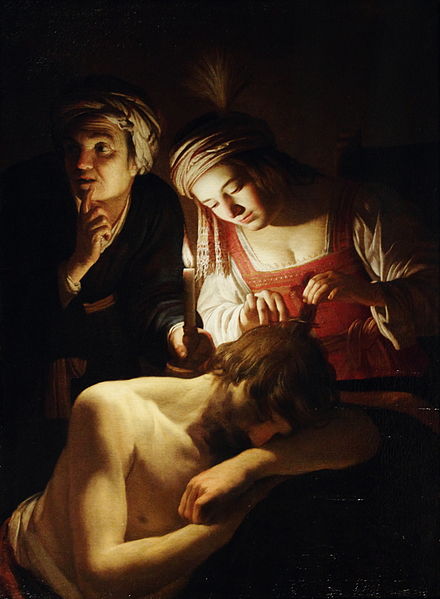H&H closes season with a powerful “Samson”
In John Milton’s poem Samson Agonistes, the freakishly strong, longhaired Israelite title warrior, is a ghost of his former self. Blinded, shaven, and devoid of his strength, Samson is forced into slavery by the Philistines. His life is all but over. “Light, the prime work of God, to me is extinct,” he laments.
Yet Samson has one more fight in him. As told in the Book of Judges, he topples the pillars of the Philistine temple with his remaining strength, thus destroying the edifice and killing everyone inside, including himself.
The story is the basis for Handel’s oratorio Samson, which Harry Christophers and the Handel and Haydn Society offered in a powerful performance Friday night at Symphony Hall.
Completed just after the premiere of The Messiah, Samson is one of Handel’s most dramatic oratorios and contains similarly lyrical and fiery vocal lines. But Handel’s instrumental writing is the soul of the story. Chromatic shadings lace the music’s sorrowful moments. At other times, the strings unleash a fury of darting figures, like strikes of lightning on a barren landscape, to capture Samson’s all-consuming anger.
H&H’s performance Friday night omitted several of the oratorio’s redundant and/or politically incorrect vocal numbers (an Act 2 chorus proudly proclaims that men are the ordained heads of the household). But the taut arrangement still left the drama intact, and a starry cast of soloists offered an interpretation that was awash in bold colors.
Tenor Joshua Ellicott conveyed Samson’s sorrow and hopelessness from the opening recitatives. His singing of the famous aria “Total Eclipse” resonated with bittersweet and penetrating intensity. He also delivered a stirring and anger-laced “Why does the God of Israel sleep?” his light tenor taking on palpable weight in the process.
Milton’s poem is especially hard on Dalila, referring to her as a hyena, among other insults. Yet soprano Joélle Harvey, a regular soloist with H&H, mined the more sympathetic side of Samson’s Philistine wife. In “With plaintive notes and am’rous moan,” her high notes floated elegantly in the space where they interweaved with silvery strands of melody from Christina Day Martinson’s violin.
Harvey’s delicate singing of “My faith and truth, O Samson prove,” which implores Samson for forgiveness, brought the H&H sopranos, posing as a choir of virgins, away from the risers to lounge at Harvey’s feet where they answered the soprano’s lines with sweet tone. When Samson drives Dalila away, Harvey’s pristine voice took on a light shake, capturing to good effect the character’s own anger in the duet “Traitor to love!”
Catherine Wyn-Rogers sang with clarity and an amber-rich mezzo-soprano as Samson’s friend Micah, a role that, through recitative, carries much of the oratorio’s narrative. She performed her Act 2 aria, “Return, O God of hosts,” with warmth.
Dashon Burton’s booming bass voice made for a burly and threatening presence as the Philistine giant Harapha. He and Ellicott traded their Act 3 recitatives with enough aggression to suit the pre-fight banter of a championship bout.
As Manoah, bass-baritone Matthew Brook was the resolute father figure to Samson. Brook also mined palpable melancholy from Handel’s score. “To sorrow now I tune my song” sounded with a mournful air well suited to the dilemma of a desperate parent witnessing his son’s pitiful condition.
The H&H chorus is stocked with some superb soloists, and two of them performed beautifully in solo roles Friday night. As the Messenger, tenor Stefan Reed sang with firm, clarion tone. And in her too-brief role as the Israelite woman, soprano Sonja DuToit Tengblad delivered her recitatives nimbly and with gleaming sound. Teaming up with the brilliant trumpeter Jesse Levine, she performed an angelic rendition of “Let the bright seraphim.”
With broad, expressive gestures, Christophers shaped elegant phrases from the chorus and period instrument orchestra.
Like the soloists, the chorus plays a dramatic role in this oratorio, portraying both sides in the long Israelite-Philistine war. The H&H singers were in their usual fine form, performing with crisp diction and execution. The Israelite choruses were particularly affecting, the music sounding with the reverence and intimacy of a church choir.
The orchestra had a fine evening as well, after a rocky start. The overture lacked rhythmic bite, and the horns’ fanfares came off choked and unfocused in pitch. But the ensemble soon found its groove, particularly in the choruses, where the musicians played with precision and glorious blend.
Samson will be repeated 3 p.m. Sunday at Symphony Hall. handelandhaydn.org.
Posted in Performances

Posted May 03, 2014 at 5:17 pm by David Chandler
Three of us friends of H&H felt immensely privileged to be present Thursday for the dress rehearsal. It was an unforgettable experience. My hope is that there may be other such opportunities in the future. As a longtime subscriber, I would gladly pay extra for the access to a rehearsal. I intend to make an unsolicited donation as a token of my thanks for Thursday’s experience !!